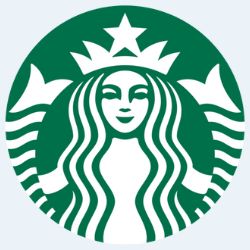Starbucks Corporation operates in the services sector, within the food retail industry, and was founded in 1971 in the United States by Jerry Baldwin, Zev Siegl and Gordon Bowker.
Headquartered in Seattle, Washington, the company has established itself as the world’s largest coffeehouse chain, with a global footprint and a business model centered on consumer experience.
Its core business involves sourcing, roasting and marketing coffee beans used in the beverages sold across its retail locations. In addition to coffee, the company offers tea, handcrafted beverages, baked goods and a variety of food products.
Starbucks markets its products under multiple brands, including Teavana, Seattle’s Best Coffee, Evolution Fresh, Ethos, Starbucks Reserve and Princi. Beyond company-operated stores, product distribution also occurs through licensed channels in supermarkets, restaurants and foodservice partners, expanding its global reach.
The company operates in 81 markets, with more than 30,000 coffeehouses worldwide. Key markets include the United States, Canada, China, Japan and the United Kingdom, where the brand is widely recognized for its customer service model and consumer experience.
Factors such as consumption trends, beverage innovation, global expansion and sustainability directly influence Starbucks’ business. The company invests consistently in technology, loyalty programs and environmental initiatives aimed at reducing its carbon footprint and promoting responsible consumption.
Its operational structure comprises company-owned stores, licensed locations, roasting facilities, distribution centers and digital operations. With a workforce of approximately 349,000 employees, the company is one of the largest employers in the global food retail sector.
History and Foundation of Starbucks Corporation
Starbucks Corporation began in 1971 when Jerry Baldwin, Zev Siegl and Gordon Bowker opened the first store at Pike Place Market in Seattle. The original concept focused on selling freshly roasted coffee beans, offering customers a differentiated experience.
During the 1980s, Starbucks’ expansion accelerated after the company was sold to Howard Schultz, who introduced a model inspired by Italian coffeehouses. This format emphasized a more inviting atmosphere and the creation of a gathering space for customers.
Growth intensified following the company’s initial public offering (IPO) in 1992, when it raised USD 25 million. Just two years later, in 1994, Starbucks launched its first drive-thru location and had already reached 425 stores across the United States. Key milestones in Starbucks’ history include:
1996: International expansion with the opening of its first store outside the United States.
2000: Reaches 3,500 stores, consolidating its position as the leader in the coffeehouse industry.
2008: Howard Schultz returns as CEO to address market challenges and the global financial crisis.
2020–2024: Expansion of digital operations, enhancement of loyalty programs and increased investment in sustainability initiatives.
Over the years, Starbucks has maintained a strategy of continuous growth, expanding its global footprint and diversifying its product portfolio.
The company is currently led by CEO Laxman Narasimhan and operates under the regulatory oversight of financial and food-safety authorities in the markets where it conducts business.
Today, Starbucks Corporation continues to invest in innovation, digitalization and sustainability, reinforcing its position as a global reference in the coffeehouse and coffee-based products market.
Additional Information
The Company Starbucks Corporation (United States), is listed on Nasdaq with a market value of $ 111.04 Billions, having an equity of $ -8.38 Billions.
With a total of 349.000 employees, the company is listed in the sector of Services and categorized in industry of Retail (Food Products).
In the last 12 months the Company had a revenue of $ 37.70 Billions, which generated a profit in the amount of $ 1.37 Billion.
As for its main indicators, the Company has a P/E ratio of 81.12, a P/BV ratio of -13.25 and in the last 12 months the dividend yield of SBUX was at 2.51%.
The Company is traded internationally through the ticker SBUX.







 Tesla
Tesla






























